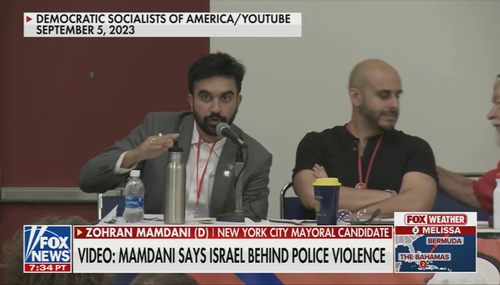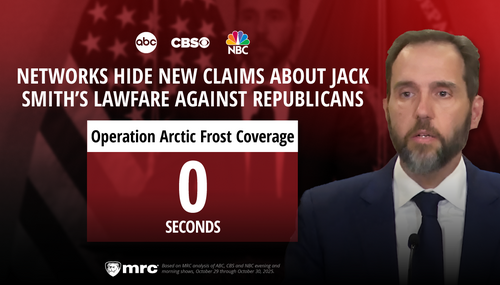Decades later, the late Sen. Joseph McCarthy remains a favorite liberal bogeyman. So who could possibly be worse? Why, Donald Trump, of course!
In a CNN This Morning segment promoting CNN's broadcast of George Clooney's Broadway play, Good Night and Good Luck, based on Edward R. Murrow's media campaign against Sen. Joseph McCarthy, host Audie Cornish played a clip of CNN's Anderson Cooper asking Clooney whether "it's worse now than in McCarthy's time." Clooney replied: "It's worse now." Nobody asked what it was like to live under communism in the 1950s.
Cornish then asked Axios media reporter Sara Fischer for her take on Clooney's claim that things are worse today, under Trump, than they were during McCarthy's time (or Eisenhower's time). Fischer dutifully agreed that things are indeed worse today. Whereas McCarthy was focused exclusively on uncovering Soviet spies, under Trump:
"It's really focused on going after anyone who pushes back against the government, who questions power."
As is common amongst liberals, Fischer displayed nostalgia for the good old days, when there were few news outlets, and all of them leaned left. "In the McCarthy era, there was [sic] three broadcast networks, maybe a handful of newspapers, that people listened to and read. In this era, it is so much easier to target journalism because the institution of journalism is disaggregated,"
Translation: the liberal media oligopoly has been weakened, and conservative voices can now compete. Fischer complained "we're in the digital era now. It's so much easier to bully and taunt people 24/7, especially because we do have people in power who are very good at using social media, who might even own their social media networks."
For her part, Cornish dismissed McCarthy's efforts as:
"The Red Scare, that time when Americans were accused of being communist sympathizers or doing things they didn't do, often without evidence."
After the Soviet Union fell, this charge of "without evidence" fell apart, but the Left still ignores and avoids the evidence. Cornish claimed "we're trying to have open debate in this country," but they refuse to engage in a debate about this evidence. There was nobody on set to challenge their leftist hot takes.
As revealed by the Venona Project, a United States counterintelligence program, there was indeed a Soviet operation to infiltrate the highest levels of the US government:
"Venona revealed the existence of Soviet espionage at the Manhattan Project's Site Y (Los Alamos). Identities soon emerged of American, Canadian, Australian, and British spies in service to the Soviet government, including Klaus Fuchs, Alan Nunn May, and Donald Maclean. Others worked in Washington in the State Department, the Treasury, OSS, and even the White House.
"The messages show that the US and other nations were targeted in major espionage campaigns by the Soviet Union as early as 1942. Among those identified were Julius and Ethel Rosenberg, Alger Hiss, Harry Dexter White (the second-highest official in the Treasury Department), Lauchlin Currie (a personal aide to Franklin Roosevelt), and Maurice Halperin (a section head in the Office of Strategic Services)."
For those who might be worried, be reassured that despite their "worse than McCarthyism" criticism, Audie and Sara somehow made it through the segment without Trump storm troopers barging onto the set to load them onto the next flight to El Salvador.
Here's the transcript.
CNN This Morning
6/6/25
6:21 am EDTEDWARD R. MURROW: We will not walk in fear, one of another. We will not be driven by fear into an age of unreason if we dig deep in our history and our doctrine.
And remember that we are not descended from fearful men. Not from men who feared to write, to speak, to associate, and to defend the causes that were for the moment unpopular.
AUDIE CORNISH: This feeling of fear, walking on eggshells, this is what I want to talk about today in Offscript, okay? Because we're trying to have open debate in this country. And we are actually in this moment, where there are a lot of concerns about that.
CNN is airing the first-ever live Broadway play, Good Night and Good Luck. Actor George Clooney plays legendary journalist Edward R. Murrow. And this is when Murrow took on Senator Joseph McCarthy, who led the Red Scare, that time when Americans were accused of being communist sympathizers or doing things they didn't do, often without evidence.
And some of that feels familiar in this time when universities, law firms, yes, even newsrooms, have been targeted in very specific ways.
. . .
SARA FISCHER: I don't think that media companies have felt this level of pressure in a very long time, probably not since the Nixon or McCarthy eras.
. . .
GEORGE CLOONEY: What's fun about the play is, although McCarthyism was bad, it wasn't anywhere near as pervasive as it is right now. The kind of fear that you see kind of stretching through law firms and universities.
ANDERSON COOPER: You think it's worse now than McCarthy's time?
CLOONEY: I do think it is worse now.
. . .
CORNISH: So, there's ways he's saying that it's worse now, and I want to get your take on that, really.
FISCHER: So the McCarthyism era was focused on finding commies. That was one specific thing. In this era, it's really focused on going after anyone who pushes back against the government, who questions power. Whether you're a university and you're trying to protect foreign students, whether you're a media organization and you're asking critical questions of the government, a law firm that's defending groups that might not align with the policies of the administration. It is more pervasive, Audie, and it is a little bit broader.
And then the other thing I'd say that's different is we're in the digital era now. It's so much easier to bully and taunt people 24/7, especially because we do have people in power who are very good at using social media, who might even own their social media networks.
In the McCarthy era, there was [sic] three broadcast networks, maybe a handful of newspapers, that people listened to and read. In this era, it is so much easier to target journalism because the institution of journalism is disaggregated, it's financially weaker, and it's just a much more convenient target.




